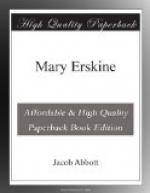While Beechnut was putting Jemmy into the wagon, Phonny ran along the road toward the horse. The horse, hearing footsteps, and supposing from the sound that somebody might be coming to catch him, was at first disposed to set off and gallop away; but looking round and seeing that it was nobody but Phonny he went on eating as before. When Phonny got pretty near to the horse, he began to walk up slowly towards him, putting out his hand as if to take hold of the bridle and saying, “Whoa—Dobbin,—whoa.” The horse raised his head a little from the grass, shook it very expressively at Phonny, walked on a few steps, and then began to feed upon the grass as before. He seemed to know precisely how much resistance was necessary to avoid the recapture with which he was threatened.
“Whoa Jack! whoa!” said Phonny, advancing again. The horse, however, moved on, shaking his head as before. He seemed to be no more disposed to recognize the name of Jack than Dobbin.
[Illustration: Catching the horse.]
“Jemmy,” said Phonny, turning back and calling out aloud, “Jemmy! what’s his name?”
Jemmy did not answer. He was fully occupied in getting into the wagon.
Beechnut called Phonny back and asked him to hold his horse, while he went to catch Jemmy’s. He did it by opening one of the bags and taking out a little grain, and by means of it enticing the stray horse near enough to enable him to take hold of the bridle. He then fastened him behind the wagon, and putting Jemmy’s two bags in, he turned round and went back to carry Jemmy home, leaving Malleville and Phonny to walk the rest of the way to Mary Erskine’s. Besides their ride, they lost the remainder of the story of Sligo, if that can be said to be lost which never existed. For at the time when Beechnut paused in his narration, he had told the story as far as he had invented it. He had not thought of another word.
CHAPTER II.
The Bride.
Mary Erskine was an orphan. Her mother died when she was about twelve years old. Her father had died long before, and after her father’s death her mother was very poor, and lived in so secluded and solitary a place, that Mary had no opportunity then to go to school. She began to work too as soon as she was able to do any thing, and it was necessary from that day forward for her to work all the time; and this would have prevented her from going to school, if there had been one near. Thus when her mother died, although she was an intelligent and very sensible girl, she could neither read nor write a word. She told Mrs. Bell the day that she went to live with her, that she did not even know any of the letters, except the round one and the crooked one. The round one she said she always knew, and as for S she learned that, because it stood for Erskine. This shows how little she knew about spelling.




